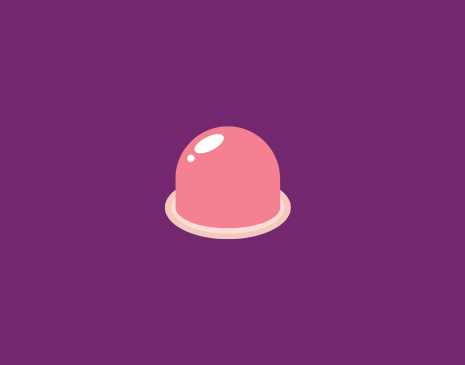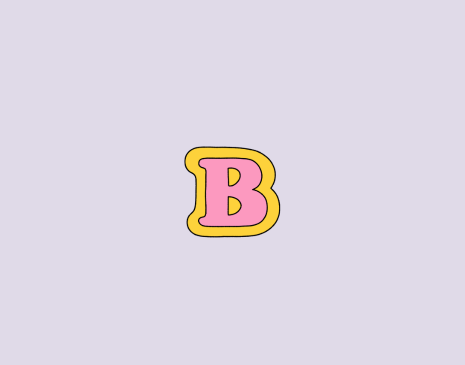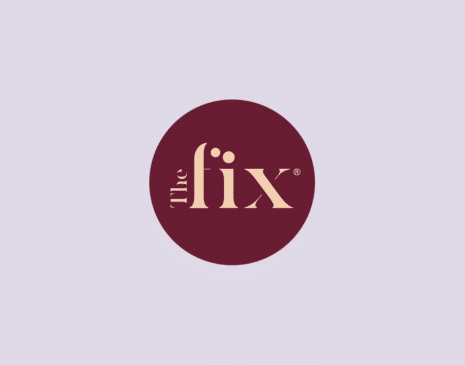Cystic acne is a relentless and often painful skin condition that goes beyond surface blemishes, infiltrating deep layers to wreak havoc on one’s complexion. In this comprehensive guide, we take a close look at cystic acne, exploring its causes and effective treatments to reclaim control over your skin. Get ready to empower yourself with knowledge that can pave the way to a blemish-free future.
Understanding Cystic Acne
Cystic acne is a severe and painful form of acne that goes beyond the typical surface blemishes. It involves the development of deep, inflamed cysts beneath the skin. These cysts are filled with pus and can cause significant discomfort. Unlike milder types of acne, such as whiteheads or blackheads, cystic acne lesions are larger, more persistent, and potentially leave lasting scars.
The root cause of cystic acne is the blockage of hair follicles by a combination of excess bacteria, oil and dead skin cells. Hormonal fluctuations, often associated with puberty, menstruation, or certain medical conditions, can contribute to the increased production of oil (sebum) in the skin, exacerbating the condition. Genetics also play a role, as some individuals may be more predisposed to developing cystic acne.
Because of its depth and severity, cystic acne can be challenging to treat with over-the-counter products alone. Dermatologists typically prescribe a combination of topical and oral medications, such as antibiotics, retinoids, or oral contraceptives, to address the underlying causes and manage symptoms. Understanding the nature of cystic acne is vital for implementing effective treatments and minimising its impact on the skin.
Causes of Cystic Acne
Cystic acne, known for its deep and painful nature, arises from a combination of factors that contribute to the formation of large, fluid-filled cysts beneath the skin’s surface. Understanding the causes of cystic acne is essential for effective management. Here are the key contributors:
Excess Oil Production (Sebum): One primary factor is the overproduction of sebum, the natural oil that lubricates the skin. Hormonal fluctuations, often associated with puberty, menstruation, or certain medical conditions, can trigger an increase in sebum production.
Hair Follicle Blockage: Cystic acne occurs when hair follicles become clogged with excess oil, dead skin cells, and bacteria. This combination creates an environment conducive to developing deep, inflammatory lesions.
Bacterial Infection (Propionibacterium acnes): The presence of bacteria on the skin, specifically Propionibacterium acnes, exacerbates cystic acne. These bacteria thrive in the blocked follicles, leading to inflammation, redness, and the formation of painful cysts.
Hormonal Fluctuations: Hormonal imbalances, especially increased androgens (male hormones), can trigger heightened sebum production. This is why cystic acne is often associated with adolescence, menstruation, pregnancy, and conditions like polycystic ovary syndrome (PCOS) – find out the first signs of PCOS.
Genetic Predisposition: Family history plays a role in determining susceptibility to cystic acne. If parents or siblings experience severe acne, there’s a higher likelihood of developing cystic acne.
Lifestyle Factors: Certain lifestyle choices, such as a diet high in refined sugars and dairy products, may contribute to acne development. Stress is another factor that can exacerbate cystic acne, although its direct impact is still under research.
Understanding these causes empowers individuals to adopt targeted skincare routines, seek professional advice, and make lifestyle adjustments to manage and prevent cystic acne effectively.
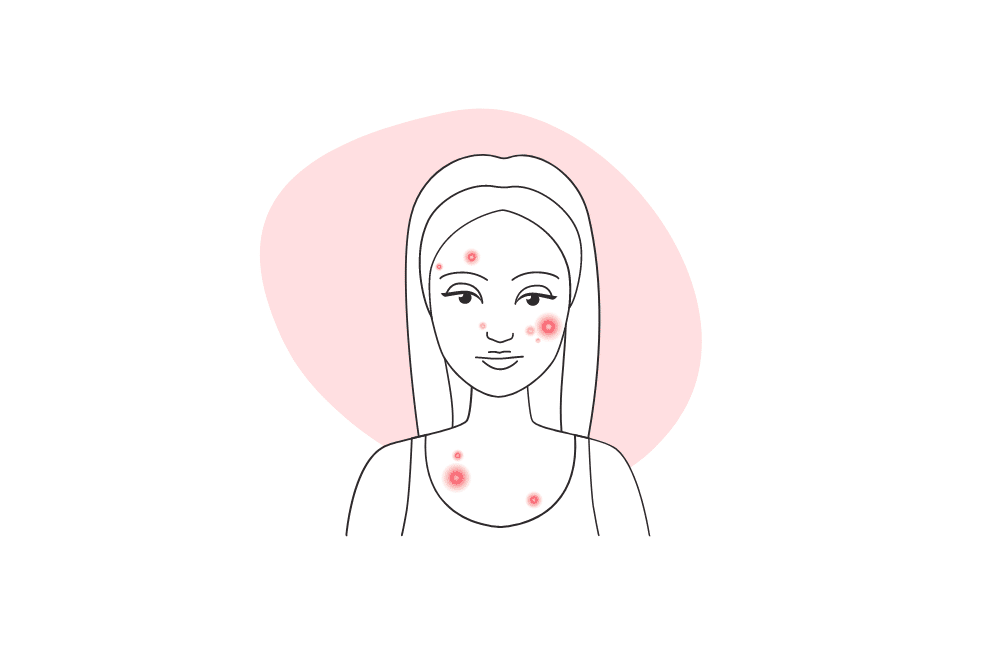
Treating Cystic Acne
Ready to take charge and combat cystic acne? Let’s explore proven treatments that go beyond the surface, tackling this stubborn skin challenge head-on. From dermatologist-approved solutions to at-home remedies, we’ve curated a comprehensive guide to help you find the perfect arsenal against cystic acne. Get ready to bid farewell to cystic acne breakouts and embrace a clearer, confident you!
Professional Interventions: Dermatologist-Backed Acne Treatments
Dermatologist-backed approaches often involve prescription topical treatments tailored to address the underlying causes of cystic acne. This may include using retinoids to promote skin cell turnover and prevent pore blockages and topical antibiotics to reduce inflammation and control bacterial growth. In more severe cases, oral medications like antibiotics may be recommended. These professional interventions aim to alleviate existing cystic acne and prevent future breakouts, with dermatologists customising cystic acne treatment plans based on individual skin types and conditions. Individuals must consult a dermatologist to receive personalised guidance and ensure the most effective and safe course of action for their needs.
At-Home Remedies: DIY Strategies for Cystic Acne Relief
While professional dermatologist-backed treatments are vital for managing cystic acne, complementing these interventions with at-home remedies can further contribute to relief and prevention.
One effective at-home strategy is maintaining a consistent and gentle skincare routine. Use a mild, non-comedogenic cleanser to cleanse the skin without causing irritation. Incorporating over-the-counter treatments containing benzoyl peroxide or salicylic acid can help reduce inflammation and unclog pores. Warm compresses can provide relief by soothing the affected area and promoting drainage of cysts.
A balanced diet rich in fruits, vegetables, and whole grains can also support overall skin health. However, it’s important to avoid picking or squeezing cystic acne lesions, as this can worsen inflammation and lead to acne scars (learn how to get rid of acne scars). While at-home remedies can be beneficial, consulting with a dermatologist ensures that chosen strategies align with specific skin needs to manage cystic acne effectively.
Lifestyle Adjustments: Nurturing Healthy Skin from Within
Nurturing healthy skin from within involves incorporating lifestyle adjustments that can complement professional treatments and at-home remedies for managing cystic acne. Adequate hydration is fundamental; drinking water for acne helps flush out toxins and supports overall skin health. Ensuring a balanced diet focusing on foods rich in antioxidants, vitamins, and minerals can contribute to skin vitality. Prioritising stress management techniques, such as mindfulness, meditation or yoga, is essential, as stress can exacerbate cystic acne.
Getting consistent, quality sleep is another vital factor in promoting skin regeneration and reducing inflammation (did you know periods can affect your sleep cycle?). Furthermore, avoiding excessive sun exposure and using sunscreen can prevent skin damage and pigmentation issues. Making these lifestyle adjustments not only aids in cystic acne management but also fosters overall well-being, positively impacting the health and appearance of the skin. As with any skincare regimen, consulting with a dermatologist can provide personalised insights and guidance tailored to individual skin needs.
Preventing Cystic Acne
Why wait for the next breakout? Let’s dive into proactive measures that act as a shield against cystic acne. In this section, we unravel the preventive strategies that can make all the difference in maintaining a consistently clear complexion. From smart skincare routines to lifestyle tweaks, we’ve got your back.
Daily Skincare Habits: Building a Strong Foundation
Establishing a robust foundation for preventing cystic acne begins with adopting disciplined daily skincare habits. A consistent and gentle cleansing routine is paramount, using a mild, non-comedogenic cleanser to rid the skin of impurities without causing irritation. Regular exfoliation, using salicylic acid or glycolic acid products, can help prevent the buildup of dead skin cells that contribute to pore blockages.
Hydration is key, as it maintains skin elasticity and supports its natural barrier function. Oil-free and non-comedogenic moisturisers can keep the skin hydrated without clogging pores. Sun protection is non-negotiable, and the daily application of a broad-spectrum sunscreen with an adequate SPF is essential to shield the skin from harmful UV rays.
Additionally, avoiding excessive touching, picking, or squeezing of the face can prevent the introduction of bacteria and minimise the risk of inflammation. These daily skincare habits collectively form a strong defence against cystic acne, promoting overall skin health and minimising the likelihood of breakouts.
Understanding Triggers: Identifying and Avoiding Culprits
Preventing cystic acne involves a proactive approach to understanding and avoiding potential triggers that can exacerbate this skin condition. Identifying and steering clear of these triggers can significantly contribute to maintaining clear and healthy skin.
For many individuals, dietary factors can play a role, and monitoring the consumption of high-glycemic foods, dairy, and excessive sugars may be beneficial. Stress is another common trigger, as heightened stress levels can contribute to hormonal imbalances that may exacerbate acne. Furthermore, being mindful of skincare and cosmetic products is essential, opting for non-comedogenic formulations and avoiding heavy, pore-clogging products. Regularly cleaning items that come into contact with the face, such as phones and pillowcases, can also prevent the accumulation of bacteria.
Stress Management: Your Skin’s Best Friend
Effective stress management serves as a powerful ally in maintaining clear and healthy skin, making it a key aspect of preventing cystic acne. Chronic stress can trigger hormonal fluctuations, leading to increased sebum production and inflammation—both associated with acne development, including cystic acne.
Incorporating stress-reduction techniques into daily life can significantly benefit the skin. Practising meditation, deep breathing exercises, and yoga can help regulate stress hormones and promote a sense of calm. Adequate sleep, regular physical activity, and engaging in hobbies or activities that bring joy also reduce stress.
Establishing a healthy work-life balance is crucial, as overwhelming stress from professional or personal responsibilities can manifest on the skin. By prioritising stress management, individuals not only enhance their overall well-being but also positively impact their skin’s resilience, ultimately reducing the likelihood of cystic acne flare-ups.
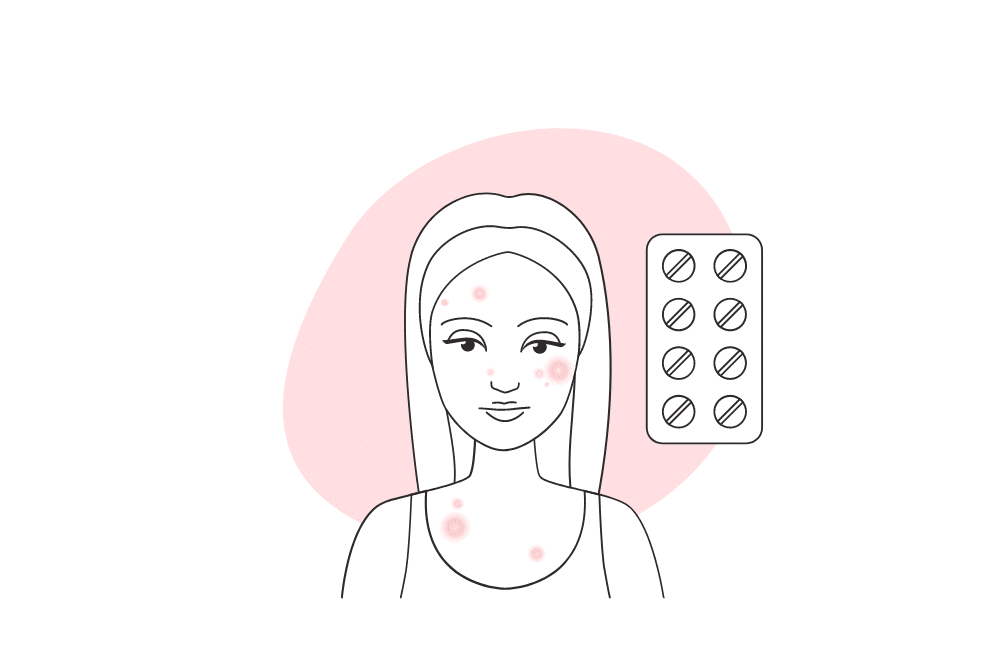
Clearing Cystic Acne
Clearing cystic acne requires a multifaceted approach that combines professional interventions, consistent at-home care, lifestyle adjustments, and a focus on overall well-being.
Dermatologist-backed treatments often include prescription medications targeting the root causes of cystic acne. At-home remedies can complement professional care with gentle cleansing, topical treatments containing benzoyl peroxide or salicylic acid, and applying warm compresses to alleviate inflammation. Lifestyle adjustments, encompassing a balanced diet, hydration, stress management, and quality sleep, contribute to skin health from within.
Consistency in daily skincare habits forms the foundation for preventing future outbreaks, encompassing regular cleansing, exfoliation, hydration, and sun protection. Understanding potential triggers, such as dietary factors and stress, allows individuals to make informed choices and minimise the risk of cystic acne recurrence. Stress management emerges as the skin’s best friend, with practices like meditation and adequate sleep helping regulate hormones and reduce inflammation.
In the journey to clear cystic acne, a holistic approach is key. It involves a commitment to professional guidance, adopting beneficial at-home practices, making lifestyle adjustments, and fostering stress resilience. By addressing cystic acne comprehensively, individuals can achieve clearer skin and cultivate long-term skin health and well-being.
Healing Cystic Acne
Embarking on the journey to heal cystic acne requires a multifaceted approach that addresses the external symptoms and the underlying causes. This section explores effective strategies to promote healing and restore your skin’s natural balance.
Gentle Skincare Rituals: Nurturing Your Skin Back to Health
Embracing gentle skincare rituals is a nurturing journey towards restoring skin health, especially for those dealing with the challenges of cystic acne. This involves a minimalist approach, prioritising products with soothing and non-irritating ingredients.
Gentle skin care extends beyond product choices to the actual application; delicately patting the skin dry and avoiding aggressive rubbing supports its healing process. These mindful rituals foster a soothing self-care routine and play a crucial role in nurturing the skin back to health, promoting recovery from cystic acne with a tender touch.
Targeted Treatments: Precision in Combating Cystic Acne
Targeted cystic acne treatments offer a precise and focused approach to combatting cystic acne, addressing the specific factors that contribute to its development. Dermatologists often recommend prescription medications as part of these targeted interventions. Oral antibiotics may be employed to control the bacterial component of cystic acne and alleviate inflammation. Potent oral retinoids are reserved for severe cases and work by reducing sebum production and preventing the formation of comedones.
In addition to oral treatments, dermatologists may utilise injectable corticosteroids for rapidly reducing inflammation in individual cysts. These targeted measures aim to interrupt the acne cycle at various stages, providing a more direct and effective approach to managing cystic acne than broad-spectrum treatments.
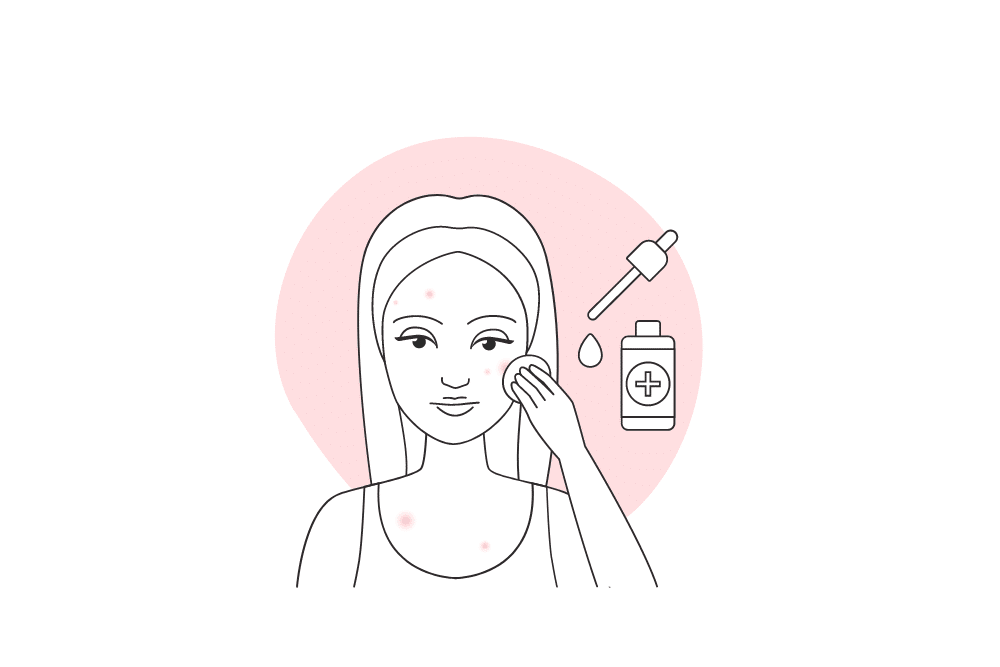
Fixing Cystic Acne
Fixing cystic acne involves a comprehensive approach that combines targeted skincare, lifestyle adjustments, and sometimes professional interventions. Here are key strategies to help address and alleviate cystic acne:
Dermatologist Consultation: Professional Guidance: Kickstart your journey to clear skin by consulting with a dermatologist. A skincare professional can assess the severity of your cystic acne, identify potential triggers, and recommend tailored treatments. Prescription medications, such as oral antibiotics or isotretinoin, may be suggested as a more aggressive intervention to treat cystic acne.
Topical Treatments: Precision in Skincare: Incorporate targeted topical treatments into your skincare routine. Opt for products containing ingredients like benzoyl peroxide, salicylic acid, or retinoids, which can help reduce inflammation and unclog pores. These treatments address the underlying causes of cystic acne and promote skin renewal.
Consistent Skincare Rituals: Gentle Care for Healing: Establish a consistent and gentle skincare routine to nurture your skin back to health. Use mild foaming facial cleanser, non-comedogenic moisturisers, and sunscreen to create a foundation for healing. Avoid harsh scrubs and abrasive products, as these can exacerbate inflammation.
Dietary Considerations: Nourishing Your Skin: Explore the connection between your diet and cystic acne. While individual responses vary, some people find that certain foods, such as dairy or high-glycemic-index items, can contribute to breakouts. Experiment with dietary adjustments to see if eliminating or reducing certain foods improves your skin condition.
Lifestyle Adjustments: Stress Management and Self-Care: Recognise the impact of stress on cystic acne and adopt stress management techniques such as meditation, yoga, or deep breathing exercises. Ensure you get enough sleep and consider lifestyle changes contributing to overall well-being.
Remember, fixing cystic acne cysts is a gradual process that requires patience and consistency. Working closely with a healthcare professional to tailor a treatment plan that suits your unique needs is essential. By combining medical advice with targeted skincare and healthy lifestyle choices, you can take significant strides toward achieving clearer, healthier skin.
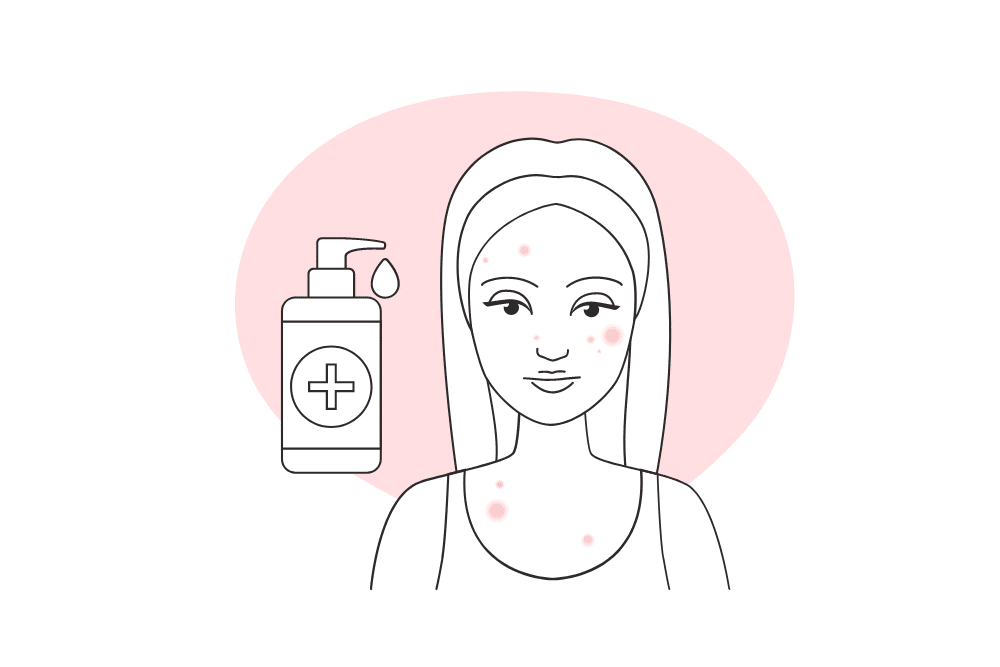
Duration of Cystic Acne
The duration of cystic acne can vary widely from person to person, and several factors influence how long an individual may experience this challenging skin condition.
Cystic acne is characterised by deep, inflamed cysts beneath the skin’s surface, and its lifespan is often longer than that of typical acne lesions. On average, cystic acne cysts and lesions can persist for several weeks to months, making the overall duration of an outbreak extend over a more extended period compared to milder forms of acne.
The longevity of cystic acne is influenced by factors such as genetics, hormonal fluctuations, and the effectiveness of the chosen treatment methods. Hormonal changes, particularly during puberty, menstruation, or conditions like polycystic ovary syndrome (PCOS), can contribute to the persistence of cystic acne. Additionally, genetic predispositions may affect how the skin responds to various treatments, influencing the overall duration of the condition.

